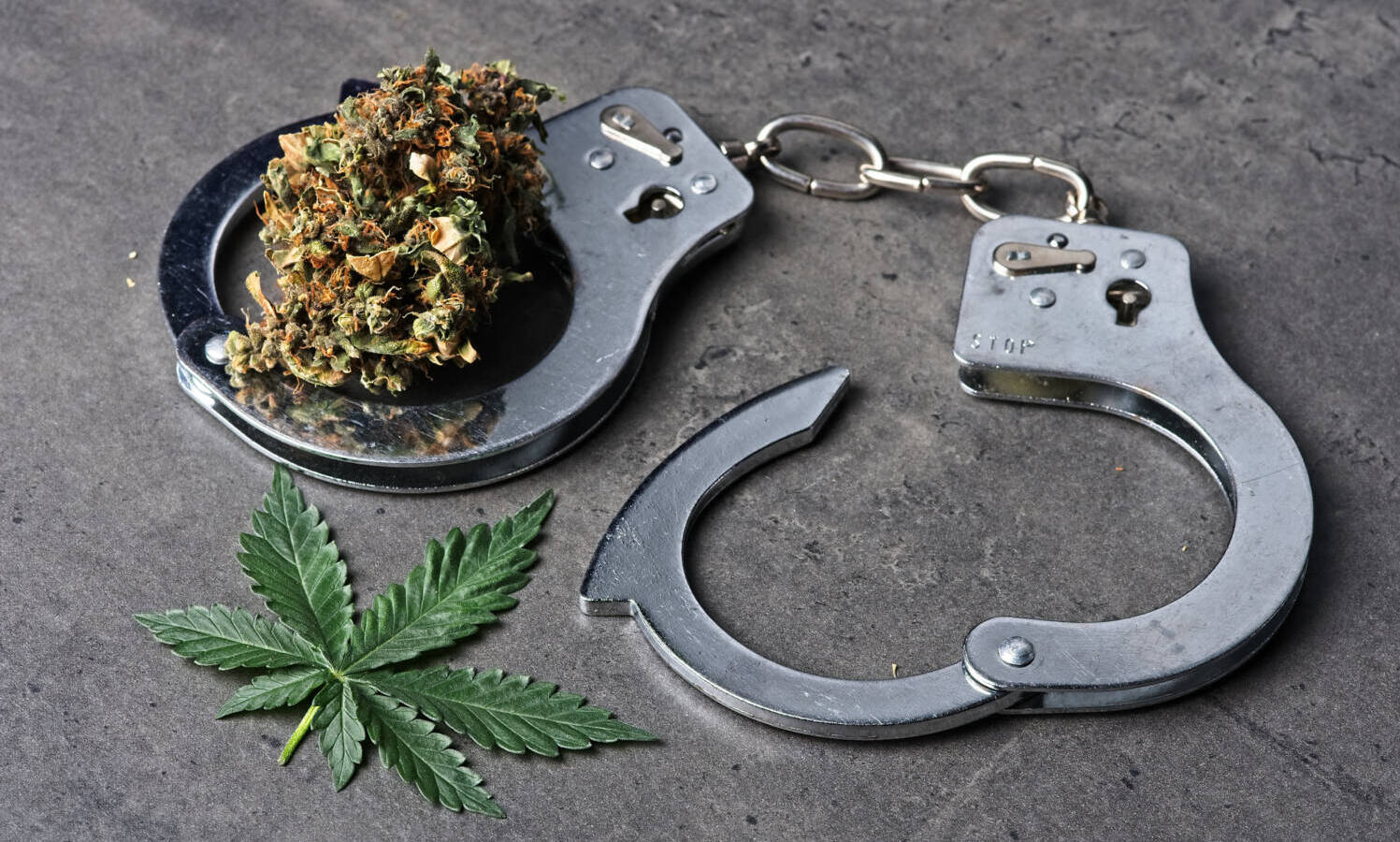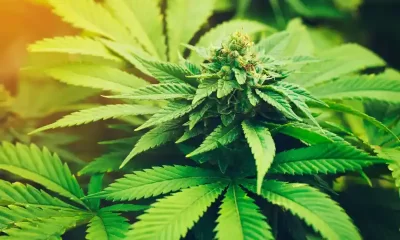Business
Federal Cannabis Sentences Drop Substantially Since 2014

While Federal possession cases are falling, prior cannabis convictions are tipping the scales to longer sentences according to a new report.
A new report issued by the U.S. Sentencing Commission found that the number of federal cannabis possession sentencings dropped substantially in recent years, from 2,172 in the fiscal year 2014 to only 145 offenders in the fiscal year 2021. For the 70.1% of cannabis possession offenders who received a sentence of imprisonment in the last five fiscal years, the average prison sentence imposed was five months.
Unfortunately, the report also noted that prior cannabis possession sentences added to an incarcerated person’s criminal history points resulting in longer sentences.
The report entitled Weighing the Impact of Simple Possession of cannabis: Trends and Sentencing in the Federal System was last issued in 2016 and was updated for the fiscal year of 2021 as many states have decriminalized possession.

Possession Still Illegal in 12 States
As of the end of the fiscal year 2021, the report stated that possession of cannabis remained illegal for all purposes in 12 states and territories. In nine states and territories, possession of cannabis is permitted solely for medical purposes. In the 14 states and territories that have decriminalized cannabis, possession of a small quantity of cannabis remains a violation of law, but it is subject to a fine with no possibility of incarceration. An additional 21 states and territories have legalized the possession of small quantities of cannabis for personal use, eliminating all penalties.

Federal Cases Fall

The report said that there was a steep rise in sentencings between fiscal years 2008 and 2013, however, the number of cannabis possession sentencings declined steadily from 1,916 in the fiscal year 2014 to just two cases in the fiscal year 2021 in Arizona. That state had led the country in Federal possession cases. Across all judicial districts, the overall number of cannabis possession sentencings followed the same pattern, declining from a high of 2,172 in the fiscal year 2014 to a low of 145 in the fiscal year 2021. Meanwhile, the number of offenders sentenced for simple possession of all other drug types remained steady across both study periods.
Incarceration Times Drop
Despite improvements in legalization, many offenders are still receiving some jail time. During the last five fiscal years, the report stated that most cannabis possession offenders (70.1%) were sentenced to a term of imprisonment, while 29.9% were sentenced to either probation or a fine only. “For those who received a sentence of imprisonment, the average prison sentence imposed was five months. Due to the relatively short average prison sentences for cannabis possession offenders, no one sentenced for simple possession of cannabis in the last five years was in Federal Bureau of Prisons (BOP) custody as of January 2022.” As of January 2022, 19 offenders were serving time for simple possession of cannabis plus another offense.
The data showed that Federal offenders sentenced for cannabis possession in the last five fiscal years tended to be male (85.5%), Hispanic (70.8%), and non-U.S. citizens (59.8%). A little over two-thirds (70.1%) were sentenced to prison and the average prison sentence imposed was five months. As of January 2022, no offenders sentenced solely for simple possession of cannabis remained in the custody of the Federal Bureau of Prisons.

Criminal History Points
While Federal possession cases are falling, prior cannabis convictions are tipping the scales to longer sentences according to the latest report. In sentencing guidelines, prior convictions can add points to a person’s profile. More points can push them into a higher sentencing category. So even though cannabis is increasingly seen as a minor offense, the prior conviction can result in a longer sentence if the person has other offenses.
The report stated, “In fiscal year 2021, 4,405 federal offenders (8.0%) received criminal history points under the federal sentencing guidelines for prior cannabis possession sentences. The criminal history points assigned under the federal sentencing guidelines for prior cannabis possession sentences resulted in a higher criminal history category for 1,765 of the 4,405 offenders (40.1%).”
Nearly all (97.0%) of the prior cannabis possession sentences were for state convictions, some of which were from states that have changed their laws to decriminalize (22.2%) or legalize (18.2%) cannabis possession, states that allow for expungement or sealing of cannabis possession records (19.7%), or some combination thereof. “Prior sentences for cannabis possession from these states resulted in higher criminal history calculations under the federal sentencing guidelines for 695 offenders. prior cannabis possession sentences resulted in a higher chc for 40.1% of federal offenders with such sentences in FY21.”
Of the 1,765 offenders whose criminal history category was impacted by a prior cannabis possession sentence, most were male (94.2%), U.S. citizens (80.0%), and either Black (41.7%) or Hispanic (40.1%).
Digging into the crime data for those offenders who saw their sentences increase as a result of prior cannabis convictions, not surprisingly drug trafficking was the most common crime type (38.0%) among the fiscal year 2021 offenders with a cannabis prior conviction. This was followed by firearms (28.9%) and immigration offenses (18.2%). Most of the 1,765 offenders whose criminal history category was impacted by prior cannabis possession sentences were male (94.2%), U.S. citizens (80.0%), and either Black (41.7%) or Hispanic (40.1%).
Source: https://thefreshtoast.com/news/federal-cannabis-sentences-drop-substantially-since-2014/
Business
New Mexico cannabis operator fined, loses license for alleged BioTrack fraud

New Mexico regulators fined a cannabis operator nearly $300,000 and revoked its license after the company allegedly created fake reports in the state’s traceability software.
The New Mexico Cannabis Control Division (CCD) accused marijuana manufacturer and retailer Golden Roots of 11 violations, according to Albuquerque Business First.
Golden Roots operates the The Cannabis Revolution Dispensary.
The majority of the violations are related to the Albuquerque company’s improper use of BioTrack, which has been New Mexico’s track-and-trace vendor since 2015.
The CCD alleges Golden Roots reported marijuana production only two months after it had received its vertically integrated license, according to Albuquerque Business First.
Because cannabis takes longer than two months to be cultivated, the CCD was suspicious of the report.
After inspecting the company’s premises, the CCD alleged Golden Roots reported cultivation, transportation and sales in BioTrack but wasn’t able to provide officers who inspected the site evidence that the operator was cultivating cannabis.
In April, the CCD revoked Golden Roots’ license and issued a $10,000 fine, according to the news outlet.
The company requested a hearing, which the regulator scheduled for Sept. 1.
At the hearing, the CCD testified that the company’s dried-cannabis weights in BioTrack were suspicious because they didn’t seem to accurately reflect how much weight marijuana loses as it dries.
Company employees also poorly accounted for why they were making adjustments in the system of up to 24 pounds of cannabis, making comments such as “bad” or “mistake” in the software, Albuquerque Business First reported.
Golden Roots was fined $298,972.05 – the amount regulators allege the company made selling products that weren’t properly accounted for in BioTrack.
The CCD has been cracking down on cannabis operators accused of selling products procured from out-of-state or not grown legally:
- Regulators alleged in August that Albuquerque dispensary Sawmill Sweet Leaf sold out-of-state products and didn’t have a license for extraction.
- Paradise Exotics Distro lost its license in July after regulators alleged the company sold products made in California.
Golden Roots was the first alleged rulebreaker in New Mexico to be asked to pay a large fine.
Source: https://mjbizdaily.com/new-mexico-cannabis-operator-fined-loses-license-for-alleged-biotrack-fraud/
Business
Marijuana companies suing US attorney general in federal prohibition challenge

Four marijuana companies, including a multistate operator, have filed a lawsuit against U.S. Attorney General Merrick Garland in which they allege the federal MJ prohibition under the Controlled Substances Act is no longer constitutional.
According to the complaint, filed Thursday in U.S. District Court in Massachusetts, retailer Canna Provisions, Treevit delivery service CEO Gyasi Sellers, cultivator Wiseacre Farm and MSO Verano Holdings Corp. are all harmed by “the federal government’s unconstitutional ban on cultivating, manufacturing, distributing, or possessing intrastate marijuana.”
Verano is headquartered in Chicago but has operations in Massachusetts; the other three operators are based in Massachusetts.
The lawsuit seeks a ruling that the “Controlled Substances Act is unconstitutional as applied to the intrastate cultivation, manufacture, possession, and distribution of marijuana pursuant to state law.”
The companies want the case to go before the U.S. Supreme Court.
They hired prominent law firm Boies Schiller Flexner to represent them.
The New York-based firm’s principal is David Boies, whose former clients include Microsoft, former presidential candidate Al Gore and Elizabeth Holmes’ disgraced startup Theranos.
Similar challenges to the federal Controlled Substances Act (CSA) have failed.
One such challenge led to a landmark Supreme Court decision in 2005.
In Gonzalez vs. Raich, the highest court in the United States ruled in a 6-3 decision that the commerce clause of the U.S. Constitution gave Congress the power to outlaw marijuana federally, even though state laws allow the cultivation and sale of cannabis.
In the 18 years since that ruling, 23 states and the District of Columbia have legalized adult-use marijuana and the federal government has allowed a multibillion-dollar cannabis industry to thrive.
Since both Congress and the U.S. Department of Justice, currently headed by Garland, have declined to intervene in state-licensed marijuana markets, the key facts that led to the Supreme Court’s 2005 ruling “no longer apply,” Boies said in a statement Thursday.
“The Supreme Court has since made clear that the federal government lacks the authority to regulate purely intrastate commerce,” Boies said.
“Moreover, the facts on which those precedents are based are no longer true.”
Verano President Darren Weiss said in a statement the company is “prepared to bring this case all the way to the Supreme Court in order to align federal law with how Congress has acted for years.”
While the Biden administration’s push to reschedule marijuana would help solve marijuana operators’ federal tax woes, neither rescheduling nor modest Congressional reforms such as the SAFER Banking Act “solve the fundamental issue,” Weiss added.
“The application of the CSA to lawful state-run cannabis business is an unconstitutional overreach on state sovereignty that has led to decades of harm, failed businesses, lost jobs, and unsafe working conditions.”
Business
Alabama to make another attempt Dec. 1 to award medical cannabis licenses

Alabama regulators are targeting Dec. 1 to award the first batch of medical cannabis business licenses after the agency’s first two attempts were scrapped because of scoring errors and litigation.
The first licenses will be awarded to individual cultivators, delivery providers, processors, dispensaries and state testing labs, according to the Alabama Medical Cannabis Commission (AMCC).
Then, on Dec. 12, the AMCC will award licenses for vertically integrated operations, a designation set primarily for multistate operators.
Licenses are expected to be handed out 28 days after they have been awarded, so MMJ production could begin in early January, according to the Alabama Daily News.
That means MMJ products could be available for patients around early March, an AMCC spokesperson told the media outlet.
Regulators initially awarded 21 business licenses in June, only to void them after applicants alleged inconsistencies with how the applications were scored.
Then, in August, the state awarded 24 different licenses – 19 went to June recipients – only to reverse themselves again and scratch those licenses after spurned applicants filed lawsuits.
A state judge dismissed a lawsuit filed by Chicago-based MSO Verano Holdings Corp., but another lawsuit is pending.
Source: https://mjbizdaily.com/alabama-plans-to-award-medical-cannabis-licenses-dec-1/
-

 Business2 years ago
Business2 years agoPot Odor Does Not Justify Probable Cause for Vehicle Searches, Minnesota Court Affirms
-

 Business2 years ago
Business2 years agoNew Mexico cannabis operator fined, loses license for alleged BioTrack fraud
-

 Business2 years ago
Business2 years agoAlabama to make another attempt Dec. 1 to award medical cannabis licenses
-

 Business2 years ago
Business2 years agoWashington State Pays Out $9.4 Million in Refunds Relating to Drug Convictions
-

 Business2 years ago
Business2 years agoMarijuana companies suing US attorney general in federal prohibition challenge
-

 Business2 years ago
Business2 years agoLegal Marijuana Handed A Nothing Burger From NY State
-

 Business2 years ago
Business2 years agoCan Cannabis Help Seasonal Depression
-

 Blogs2 years ago
Blogs2 years agoCannabis Art Is Flourishing On Etsy













